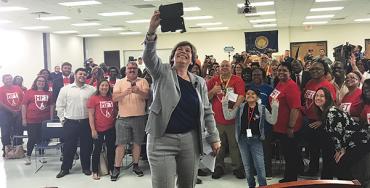The Best Economy Ever?
Fact-checkers have their hands full during Donald Trump’s presidency, but one point is indisputable: Trump ran for president as a populist yet is governing to benefit America’s elites.
Trump boasts that the economy is the “best ever,” but nearly all of the benefits of economic growth have gone to the wealthiest Americans and large corporations. And, while Trump promised that “everybody is getting a tax cut, especially the middle class,” in the first year after Trump’s tax law went into effect individual taxpayers paid $93 billion more in taxes, after refunds. Big businesses paid about $91 billion less.
Trump’s economy hurts the very people he pledged to champion—working and middle-class Americans. Nobel Prize-winning economist Joseph Stiglitz notes that 90 percent of Americans have seen their income stagnate or decline in the past 30 years. Today, the 400 richest Americans, 0.00025 percent of the population, have more wealth than the 150 million adults in the bottom 60 percent. Trump promised to address this new Gilded Age, but, as president, he has carried out an agenda that helps oligarchs like him and Education Secretary Betsy DeVos and leaves the rest of us behind.
While the rich have never been richer, 40 percent of Americans say they wouldn’t be able to come up with $400 to cover an emergency. Trump has reneged on his pledge to raise the federal minimum wage, and his administration has limited workers’ eligibility for overtime pay. Despite promising “insurance for everybody,” Trump’s first priority as president was passing legislation to strip healthcare coverage from 20 million Americans and end protections for tens of millions more with pre-existing conditions, leaving them one illness away from bankruptcy—or worse.
In this season of college commencements, newly minted graduates are facing the first of many student loan payments. Student loan debt has reached $1.5 trillion. The Trump administration has completely sabotaged debt relief options for teachers, nurses and other public service workers. I hear from too many people who worry they will be paying off their student “debt sentence” until they die.
Between student loans, higher healthcare and housing costs, and stagnant wages, millennials are far worse off financially than generations before them, with the average net worth below $8,000. And retirement doesn’t look much rosier. About 42 percent of Americans will retire broke, meaning they have less than $10,000 saved, a fraction of what they would need to survive even one year in retirement. So much for the “best economy ever.”
These statistics make clear why there is so much anger and anxiety today in the United States, and why unions are getting a second look. My union, for example, stands at the nexus of two of the surest vehicles to increase opportunity for ordinary Americans—the labor movement and public education, both of which the Trump administration has sought to undermine. Trump has packed federal courts with pro-business, anti-worker judges. His administration has moved to undercut the power of unions and restrict workers’ opportunities to join unions. Trump and DeVos have pushed to cut more than $9 billion from education funding, and DeVos works overtime to get her friends in state governments to defund and destabilize public education.
Public schools play a vital role in developing skills and knowledge, reducing polarization and strengthening the economy. But there is something of a “chicken and egg” quandary: Do great public schools help create a thriving middle class, or vice versa?
As important as schooling is, it alone cannot overcome the country’s vast inequality. I am glad to see others starting to understand that, like entrepreneur Nick Hanauer, who explains in the July issue of The Atlantic why he no longer believes that education is the cure to all that ails America. Hanauer realizes that our education system can’t compensate for the ways our economic system is failing Americans. Research shows that the single greatest driver of student achievement is household income, which has barely budged since 2000. “Pay people enough to afford dignified middle-class lives,” he writes, “and high-quality public schools will follow. But allow economic inequality to grow, and educational inequality will inevitably grow with it.”
Our political and economic systems are so weighted toward the wealthy that opportunity will only come through the power of collective action that unions and voting—the third vehicle to increase opportunity—provide. As inequality grows and the middle class shrinks, we must organize, not agonize. From teacher walkouts to fast-food worker strikes to union drives in newsrooms, working people are coming together to accomplish what they cannot do alone. Americans live with daily reminders that elections have consequences. We must use the power of our vote to elect leaders who will govern in the best interest of all Americans, not just the wealthy few.

